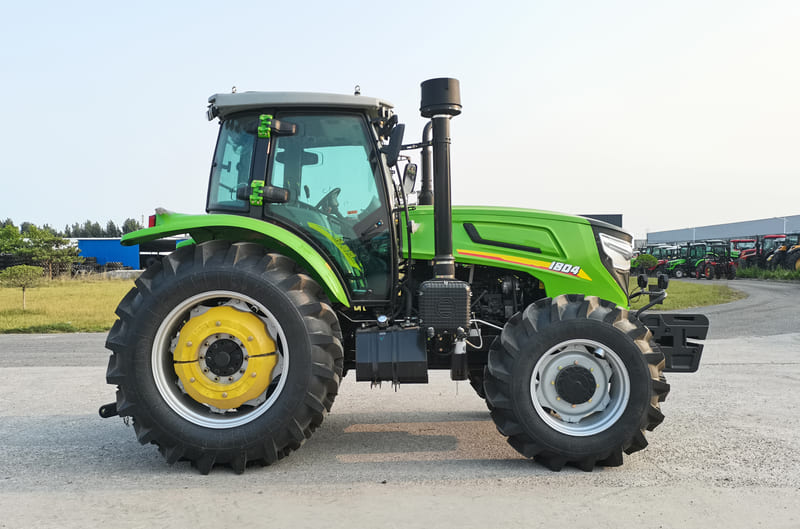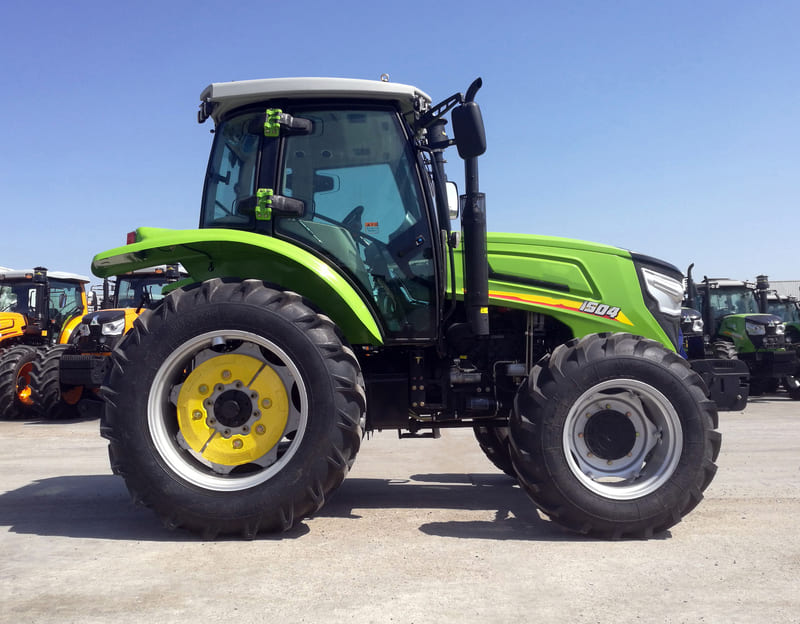Ever wondered what keeps a trusty tractor running for years?
A tractor's longevity hinges on regular maintenance, how intensely it's used, and the conditions it operates in. Consistent care helps dodge major repairs and keeps performance sharp. Plus, tractors that aren't pushed to their limits or face tough environments often stick around longer.
I remember when I first got my hands on an old tractor from my granddad. He always said, "Treat it like you would a prized horse." At first, I didn’t get it, but now I see how regular tune-ups and gentle handling keep it purring like new. Let’s dive into how keeping a sharp eye on maintenance, thoughtful usage, and mindful environmental awareness can truly stretch out the life of these hardworking machines.
Regular maintenance extends tractor lifespan.True
Regular maintenance prevents major repairs and ensures optimal performance.
Tractors in harsh environments last longer.False
Harsh environments accelerate wear and tear, reducing tractor lifespan.
How does regular maintenance affect tractor lifespan?
Ever wondered how some tractors just seem to last forever while others barely make it past a few years?
Regular maintenance can greatly increase a tractor's lifespan by minimizing wear and tear, enhancing efficiency, and reducing expensive repairs. This involves routine checks, timely replacements, and consistent monitoring of vital components.

Importance of Regular Maintenance
I remember the first tractor my family owned. It was a workhorse, always ready to tackle the toughest jobs. But there was a secret to its longevity—regular maintenance. It wasn't just about oil changes and filter swaps; it was a ritual that kept our machine humming along like new.
- Component Longevity: Think of it like tending to a garden. Regular oil changes, filter replacements, and lubrication are the water and sunlight that keep those moving parts thriving.
- Optimal Performance: A well-maintained tractor feels different. It runs smoother, consumes less fuel, and even the air seems cleaner when you're in the cab.
- Safety Assurance: Routine inspections aren’t just about keeping the machine running; they're about peace of mind. They catch the little issues before they become big problems.
Maintenance Schedule
Crafting a maintenance schedule1 is like creating a roadmap for your tractor's health. Here's a simple guide I follow:
| Maintenance Task | Frequency |
|---|---|
| Oil and Filter Change | Every 100 hours |
| Air Filter Replacement | Every 200 hours |
| Tire Pressure Check | Monthly |
| Brake System Inspection | Every 500 hours |
| Battery Maintenance | Bi-Annually |
Cost Benefits
Sure, there's a price tag attached to regular maintenance. But here's what I learned from experience: it's a fraction of what you'll spend on major repairs if things go south.
- Cost Comparison:
- Routine Maintenance: $300-$1,000 annually
- Major Repairs: Can exceed $10,000
Following a structured maintenance plan2 isn't just about saving money; it's about keeping your tractor in the game for as long as possible.
Impact on Resale Value
I once sold an old tractor that had been meticulously cared for. The buyers almost couldn't believe how well it ran for its age. A detailed maintenance history can be your best bargaining chip.
- Resale Value Factors:
- Maintenance records showcasing regular servicing
- Condition of key components such as the engine and transmission
So, when I think about regular maintenance, it's not just a chore—it's an investment in the future of my equipment. For more tips on maintaining farm equipment, explore the best practices3 recommended by industry experts.
Regular maintenance reduces tractor fuel consumption.True
Well-maintained tractors operate more efficiently, using less fuel.
Skipping maintenance increases tractor resale value.False
A documented maintenance history increases a tractor's resale value.
How Does Tractor Usage Affect Wear and Tear?
Ever wonder how tractor use affects its longevity and efficiency?
Tractor usage plays a pivotal role in wear and tear, influenced by factors like operational hours, terrain, and maintenance habits. Regular check-ups and following a strict maintenance schedule can significantly extend a tractor’s lifespan.

Factors Influencing Wear and Tear
You know, I've spent countless hours on my tractor, and one thing's clear—the more you use it, the quicker it wears down. It's like a pair of favorite boots; the more miles you put on them, the quicker they start showing signs of wear. Here's what I've learned along the way:
1. Hours of Operation:
It's straightforward—the longer a tractor runs, the faster its components degrade. Just like my old pickup that gave up after too many miles without proper care, tractors need regular inspections4 to stay in top shape.
2. Terrain and Work Type:
Have you ever tried driving on a rocky trail versus a smooth road? Your vehicle feels every bump and so does your tractor. Rugged terrains and heavy tasks like plowing can really stress those components out more than you might think.
3. Maintenance Practices:
I've learned the hard way that skipping maintenance is like skipping oil changes in your car—it never ends well. Sticking to the manufacturer's schedule ensures everything runs smoothly before something major fails.
4. Operator Skills:
I remember my first time operating a tractor; let's just say I wasn't winning any awards for smooth driving! Inexperienced operators can easily cause unnecessary damage5 if they're not careful.
The Impact of Environmental Conditions
Living in an area with extreme weather conditions, I've seen firsthand how climate can accelerate wear on machinery. Whether it's dust clogging filters or cold weather thickening lubricants, these factors are real game-changers.
| Condition | Impact on Wear |
|---|---|
| Dusty Areas | Clogs filters quickly |
| Humid Conditions | Corrosion and rusting |
| Cold Weather | Thickens lubricants |
Being aware of these impacts lets us take preventive measures to keep things running smoothly.
Importance of Using Quality Parts
I've always believed in the "you get what you pay for" philosophy. Investing in high-quality parts might seem expensive upfront, but trust me, it pays off in the long run by reducing breakdowns and keeping maintenance costs low.
Implementing Technology for Better Monitoring
In today's tech-savvy world, my tractor's sensors are lifesavers. They provide real-time data on engine performance, helping me implement proactive maintenance strategies6 and tackle issues before they become serious.
High usage accelerates tractor wear.True
More operation hours lead to faster component degradation.
Rugged terrains reduce tractor wear.False
Rugged terrains cause more strain, increasing wear on components.
How Do Environmental Conditions Impact Tractor Durability?
Ever wondered why your trusty tractor seems to wear out faster in certain weather? Let’s dive into how environmental conditions can make or break your farm machinery.
Environmental conditions play a huge role in tractor durability by impacting wear and tear. Elements like humidity, temperature swings, and soil types can wear down mechanical parts, demanding specific maintenance for peak performance and longevity.

When I first started managing my family's farm, I was baffled by how quickly our tractors would seem to age in the harsh summer heat. It wasn’t until I dug deeper that I realized the environment was the unseen hand accelerating this wear. Here's what I discovered about the elements that can test even the sturdiest tractors.
The Impact of Temperature Extremes
One winter, I recall wrestling with our old tractor's engine, gritting my teeth as it struggled to start. It turns out, cold weather thickens engine oil7, making it tough to crank up and causes more wear. Conversely, sweltering summers can lead to overheating, putting engine components under stress.
Humidity and Corrosion
Living in a humid area, I’ve seen firsthand how moisture loves to sneak into crevices, speeding up rust on metal parts. Regular checks for rust, especially in joint areas8, became part of my routine to combat this relentless foe.
Soil Types and Wear
We deal with varied soils on our land. Sandy soils can be brutal, grinding down tires quickly, while the heavy clay can clog up mechanisms. Choosing the right tire type9 has been a game-changer for me.
| Soil Type | Impact on Tractors |
|---|---|
| Sandy | High abrasion |
| Clayey | Clogging issues |
| Loamy | Balanced impact |
Effects of Rainfall and Flooding
I remember the monsoon season when our fields turned into swamps, challenging our tractors' resilience. Water-resistant seals and frequent maintenance checks proved crucial to keep them running smoothly amidst such challenges. See how you can improve tractor waterproofing10 techniques.
Dust and Air Quality
On particularly dry days, dust seems to invade every nook and cranny of the farm machinery. Clogged air filters are a common sight, reducing engine efficiency. Frequent filter cleaning became a part of my checklist. Understanding the impact of dust on machinery11 is important for maintenance planning.
Maintenance Strategies for Different Environments
Tailoring maintenance routines to our local conditions has been key. In colder climates, using special antifreeze formulations helps, whereas in humid zones, keeping an eye on rust is essential. Exploring environment-specific maintenance12 strategies has been enlightening.
Keeping an eye on these factors and tweaking maintenance plans has significantly boosted our tractors’ lifespan. It's about working with nature, not against it, to ensure reliable performance.
Cold weather thickens engine oil, causing start issues.True
Cold temperatures increase oil viscosity, making engines harder to start.
Loamy soils cause the most wear on tractor tires.False
Loamy soils have a balanced impact, not causing excessive wear.
Are Some Tractor Brands More Durable Than Others?
When it comes to tractors, choosing the right brand can make or break your farming efficiency. But are some brands truly more durable than others?
Yes, some tractor brands are indeed more durable, thanks to superior engineering and quality control. Brands like John Deere and Kubota are renowned for their longevity, often outlasting lesser-known competitors with proper maintenance.

Understanding Durability in Tractors
When I think about durability in tractors, it's not just about how long they last physically—it's about how well they withstand the daily grind without constant breakdowns. It reminds me of a farmer I met at a trade show who swore by his John Deere. He said the quality materials used in its construction were like a suit of armor against wear and tear.
-
Quality of Materials: High-grade materials can significantly extend a tractor's life. For instance, John Deere13 is famous for using robust materials that seem to laugh in the face of rust.
-
Engineering Excellence: I once chatted with a mechanic who praised Kubota14 for their innovative designs. The attention to detail in their engineering often means these machines stick around longer than others.
-
Maintenance Needs: I can't stress enough how regular maintenance is crucial. Brands that offer solid support and easy-to-find parts make it simpler to keep tractors in top shape, almost like having a loyal friend who's always there when things go awry.
Comparing Durability Across Brands
I've done some digging and here's what I've found about brands known for their durability:
| Brand | Known For | Durability Feature |
|---|---|---|
| John Deere | High-quality materials | Long-lasting with minimal repairs |
| Kubota | Innovative engineering | Low maintenance needs |
| Massey Ferguson | Robust construction | Excellent customer support |
| New Holland | Advanced technology integration | Durable under heavy workloads |
| Cropilots | High cost performance and solid core components | Built in our own plant with exceptional durability |
Factors Influencing Tractor Durability
In my experience, several factors influence how durable a tractor feels:
-
Design and Build Quality: A well-researched design often means fewer problems down the line.
-
Customer Feedback: Real-life performance insights from customer reviews15 are invaluable. They give you a peek into longevity and common hiccups.
-
Brand Reputation: Established names like Massey Ferguson16 have decades of customer satisfaction backing their durability claims.
The Role of Regular Maintenance
I've learned that regular maintenance can breathe new life into any tractor. Following maintenance guides17 from manufacturers is a smart move—they're filled with tips to catch issues before they become costly problems.
Consideration for Purchase Decisions
When I'm evaluating a tractor purchase, I look beyond the initial price tag. It's about the long haul, weighing potential savings from a durable choice. Even if it means a higher upfront cost, it could pay off with fewer repairs over time. Resources on tractor lifespan comparisons18 help paint a clearer picture of what you're really getting into.
Choosing the right brand isn't just about ticking boxes; it's about aligning with your unique needs and circumstances. While some brands are celebrated for their endurance, it's crucial to consider your personal context when deciding.
John Deere uses high-quality materials for durability.True
John Deere is renowned for using robust materials that resist wear.
Massey Ferguson lacks customer support for maintenance.False
Massey Ferguson is known for excellent customer support and reliability.
How can I make my tractor last longer?
When I think about how crucial my tractor is to my daily operations, it hits me that its lifespan can make or break my productivity and wallet.
Extending your tractor's lifespan involves sticking to a regular maintenance routine, using high-quality parts and fluids, and diligently keeping records. Safe storage and careful operation are also vital for longevity.

Regular Maintenance Schedule
You know, every time I hear that unmistakable rumble of the tractor engine, I'm reminded of the importance of routine check-ups. It's like a doctor’s visit for your machine—essential. I’ve learned to keep track of oil changes, swap out filters, and inspect every nook and cranny for wear and tear. For me, changing the engine oil every 50 hours and checking those air filters every 10-15 hours is second nature. It’s all about staying ahead of potential problems, like using a maintenance checklist19 that keeps me organized.
| Maintenance Task | Frequency |
|---|---|
| Engine Oil Change | Every 50 hrs |
| Air Filter Replacement | Every 10-15 hrs |
High-Quality Parts and Fluids
One lesson I picked up early on is that skimping on quality can cost more in the long run. It’s tempting to go for cheaper parts, but investing in OEM parts and the right fluids can save headaches down the road. I’ve switched to synthetic oils20 for better performance, especially under extreme conditions. Trust me, your tractor will thank you.
Accurate Record Keeping
I’ll admit, keeping detailed records wasn’t always my strong suit. But jotting down each maintenance task helps me spot trends and plan ahead. It’s like having a crystal ball for my tractor’s health.
Proper Storage Practices
Let me tell you about the time I left my tractor exposed to the elements—big mistake! Now, I always make sure it’s tucked away in a dry, covered spot, shielded from harsh weather. Seasonal changes require extra attention; those storage tips21 come in handy.
Careful Operation Techniques
Training myself and anyone who hops on my tractor to handle it with care has been crucial. It’s all about avoiding unnecessary strain—no overloading or pushing beyond limits. And don’t forget about those tires; keeping them properly inflated makes a world of difference.
Conclusion
In essence, making my tractor last is about commitment to a routine, quality investment in parts, and smart storage and usage habits. For even more tailored advice, I might reach out to a tractor maintenance expert22. Each step I take now is an investment in countless hours of reliable service later.
Engine oil should be changed every 100 hours.False
The context states engine oil should be changed every 50 hours.
Proper storage reduces tractor wear and tear.True
Storing tractors in dry, covered areas prevents rust and damage.
Conclusion
Tractor longevity depends on regular maintenance, usage intensity, and environmental conditions. Proper care, quality parts, and mindful operation significantly enhance performance and lifespan.
-
Discover various maintenance schedules to keep your tractor running efficiently. ↩
-
Explore how structured maintenance plans can save money and prolong tractor life. ↩
-
Get expert advice on maintaining your farm equipment effectively. ↩
-
This link offers insights on recommended inspection intervals, helping ensure your tractor stays in optimal condition. ↩
-
Discover the advantages of training operators to minimize misuse and extend machinery life. ↩
-
Explore technologies that help monitor tractor health and streamline maintenance schedules. ↩
-
Discover how cold temperatures affect engine oil viscosity, impacting tractor startup and performance. ↩
-
Explore techniques to prevent rust in tractors exposed to humid conditions for improved longevity. ↩
-
Learn about selecting appropriate tires to minimize wear based on soil type and improve tractor efficiency. ↩
-
Find methods to enhance tractor waterproofing, protecting against damage from heavy rains or floods. ↩
-
Understand how dust affects tractor components and ways to maintain efficiency in dusty environments. ↩
-
Discover tailored maintenance plans that address specific environmental challenges for extended tractor life. ↩
-
Learn about John Deere's commitment to using high-grade materials for enhanced durability. ↩
-
Discover how Kubota's engineering innovations contribute to their tractors' long-lasting performance. ↩
-
Explore customer reviews to understand real-world experiences with tractor durability. ↩
-
Read about Massey Ferguson's reputation for producing robust and durable tractors. ↩
-
Access detailed maintenance guides to ensure your tractor remains in top condition. ↩
-
Compare different brands based on expected lifespan to make an informed purchase decision. ↩
-
A comprehensive checklist ensures all routine maintenance tasks are accounted for, preventing oversight. ↩
-
Synthetic oils offer superior protection and performance benefits under extreme conditions. ↩
-
Proper seasonal storage methods protect tractors from environmental damage during inactive periods. ↩
-
Consulting a local expert provides personalized maintenance advice, optimizing your tractor's longevity. ↩




